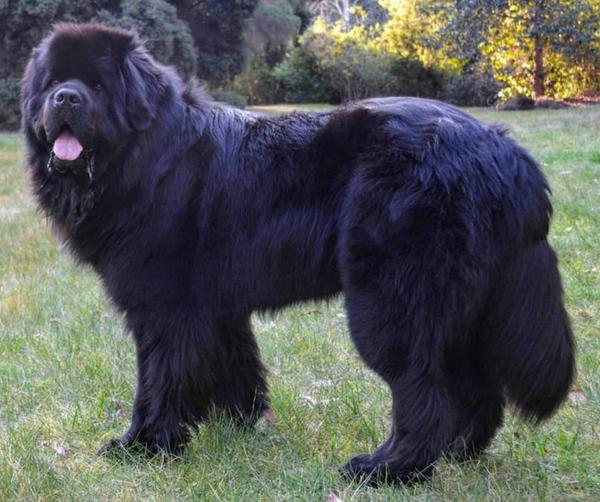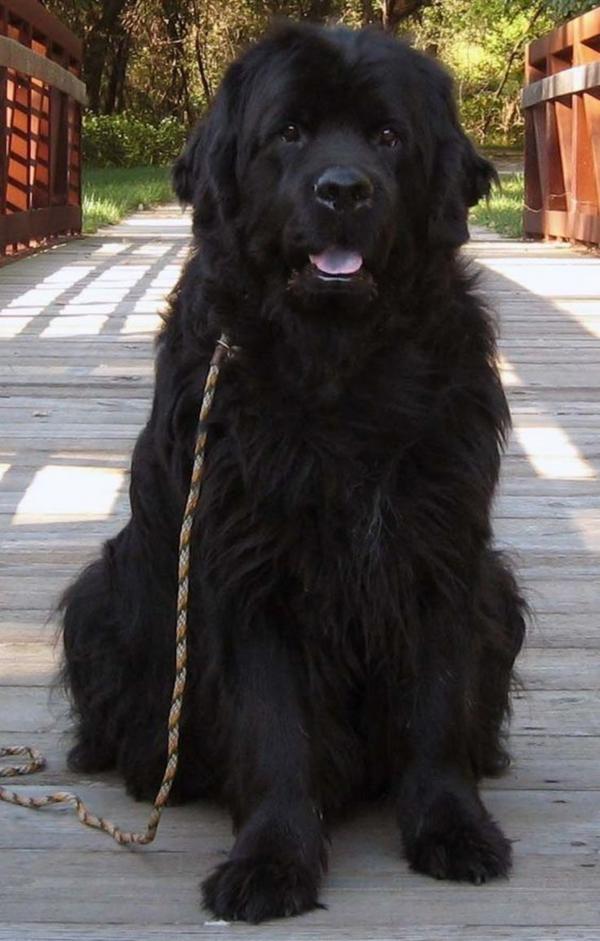Newfoundland
also known as Newf, Newfie, The Gentle Giant, Blackbear

 Summary
Summary
The Newfoundland is a large, powerful breed of dog known for its strength, loyalty, and gentle nature. Originating from the Canadian province of Newfoundland, the breed is recognized by major kennel clubs such as the American Kennel Club (AKC) and the Canadian Kennel Club (CKC). They have been used for tasks such as rescue work, cart pulling and as draft animals. They are also known for their loyalty and protective instincts, making them great watchdogs and companions, and good with children. They have webbed paws which makes them great swimmers and were used for water rescue. They have a relatively healthy lifespan.
Breed Information
Is Newfoundland a purebred?
Purebred
How do you pronounce the Newfoundland name? How do you say Newfoundlands?
New-fun-land / Newf-in-land
What were Newfoundlands originally used for?
all-purpose water dog and fishing aid, draft
How Long Do Newfoundlands Live? What is average life expectancy for a Newfoundland? How long can Newfoundlands live?
9-12 years
The average Newfoundland lifespan is somewhere between 9-12 years, provided they aren't beset by any exceptional health issues or injuries.
Newfoundland Height & Weight
How big is a full grown Newfoundland?

| Height | ||||
|---|---|---|---|---|
| Average | 6 months | 12 months | 18 months | |
| Male | 27-29 inches (68.6 - 73.7 cm) | 24.0 inches (61 cm) | 27.0 inches (68.6 cm) | 28.0 inches (71.1 cm) |
| Female | 25-27 inches (63.5 - 68.6 cm) | 22.0 inches (55.9 cm) | 25.0 inches (63.5 cm) | 26.0 inches (66 cm) |
| Weight | ||||
|---|---|---|---|---|
| Average | 6 months | 12 months | 18 months | |
| Male | 130-150 pounds (59 - 68 kg) | 105.0 pounds (48 kg) | 125.0 pounds (57 kg) | 140.0 pounds (64 kg) |
| Female | 100-120 pounds (45 - 54 kg) | 75.0 pounds (34 kg) | 95.0 pounds (43 kg) | 110.0 pounds (50 kg) |
Do Newfoundlands get fat easily?
![]()
![]()
![]()
![]()
![]()
The Newfoundland is a breed that has an average to high tendency to gain weight if their weight is not closely monitored. It is important to maintain a balance between exercise and food intake to keep them at a healthy weight. This can be achieved by scheduling at least one daily walk and engaging in regular playtime with them.
Are Newfoundlands Hypoallergenic?
No
Unfortunately, the Newfoundland is not hypoallergenic, making it not a good choice for a dog lover who suffers from pet allergies.
What is a Newfoundland personality? What are Newfoundland dogs best known for?
Cheerful
Intelligent
Social
Gentle
Courageous
Loyal
Sweet
Are Newfoundlands heavy shedders? How Much Does a Newfoundland Shed?
![]()
![]()
![]()
![]()
![]()
Newfoundland dogs are extremely heavy shedders, they will lose a large amount of hair each year. To decrease the amount of shedding, you can regularly brush your Newfoundland.
What is the watchdog ability of a Newfoundland dog?
![]()
![]()
![]()
![]()
![]()
The Newfoundland dog is one of the best choice if you want a good watchdog. This breed will keep watch over you and your family at all times. This breed takes this task seriously and will typically perform its guarding duty with little to no training. This dog will require obedience training, or you can consider guard dog training to sharpen its skills.
Breed History
Where do Newfoundlands come from?
Canada
What are Newfoundlands descended from?
tibetan mastiff
What organizations or kennel clubs recognize/register the Newfoundland breed?
American Canine Registry
American Kennel Club
America's Pet Registry
Canadian Kennel Club
Dog Registry of America Inc.
Federation Cynologique Internationale
Kennel Club of Great Britain
North American Purebred Registry, Inc.
American Canine Association, Inc.
Australian National Kennel Council
Continental Kennel Club
National Kennel Club
New Zealand Kennel Club
United Kennel Club
When were Newfoundlands first bred? How old is the Newfoundland breed?
1700s
What Breed Group is a Newfoundland?
Working (AKC:1886)
Guardian Dog (UKC)

Newfoundland Appearance
What color are Newfoundland eyes?
Brown
What color can Newfoundland nose be naturally?
Black
What color can Newfoundland coat be naturally?
Black
Gray
Brown
Cream
Pied
Brindle
How long is a Newfoundlands coat?
![]()
![]()
![]()
![]()
![]()
The coat of a Newfoundland is longer than that of the typical dog.
How Dense Is The Newfoundland Coat?
![]()
![]()
![]()
![]()
![]()
What is the texture of the hair of a Newfoundland?
Wavy
How many puppies can a Newfoundland have in a litter? How many puppies can a Newfoundland have in her first litter?
9-12 puppies per pregnancy
A Newfoundland can have a litter of 9-12 puppies on average. However, it's worth noting that the size of the litters can vary greatly. Factors that can influence litter size include the health of the mother, breeding history, and genetics.
![]()
![]()
![]()
![]()
![]()
The adaptability of Newfoundland dogs is a well-known trait, they are known for being able to adjust well to different living environments and lifestyle changes.

Newfoundland Health Issues
Do Newfoundlands have a lot of health problems?
![]()
![]()
![]()
![]()
![]()
The Newfoundland is a very healthy breed, with little need for frequent vet visits. However, it's important to keep an eye on their health and have them checked by a veterinarian when needed.
What are the major health concerns to be aware of when owning a Newfoundland?
Gastric Torsion
Elbow Dysplasia
Pulmonic Stenosis
Hip Dysplasia
Subvalvular Aortic Stenosis
What are the less significant issues to keep in mind when it comes to Newfoundlands?
Entropion
Cataract
Osteochondritis Dissecans
What are the occasional tests recommended for Newfoundland breed?
Cardiac
Eye
Hip
Elbow
Blood
X-Rays
Eye Examination
Physical Examination

Newfoundland Needs and Activities
Do Newfoundlands have a lot of energy?
![]()
![]()
![]()
![]()
![]()
For those who lead a balanced lifestyle, Newfoundlands may be a good choice as they have an average energy level.
Do Newfoundlands need socialization? How social are Newfoundlands?
![]()
![]()
![]()
![]()
![]()
Newfoundland have above average social needs compared to other breeds.They thrive in environments where they have a lot of interaction with humans and other dogs.
How much exercise should Newfoundlands get?
![]()
![]()
![]()
![]()
![]()
The Newfoundland dog requires a moderate amount of physical activity to maintain a healthy lifestyle. These breeds are ideal for people who have a moderate amount of time to devote to their pet and enjoy regular physical activity themselves. They also make great family pets as they have the energy to keep up with children and the temperament to be great companions.
How much sleep should a Newfoundland have? Do Newfoundlands sleep a lot?
![]()
![]()
![]()
![]()
![]()
The Newfoundland breed is known for its moderate energy levels and normal sleep patterns, typically sleeping around 12-14 hours per day.
Does a Newfoundland drool a lot?
![]()
![]()
![]()
![]()
![]()
The Newfoundland is a breed known for excessive drooling which can cause a lot of drool to be left on clothes. If this is unappealing to you, it may be best to consider a different breed of dog.
How much does it bark?
![]()
![]()
![]()
![]()
![]()
Newfoundland dogs tends to bark less frequently than most other dogs. They tend to be quieter and less vocal than other breeds. They may only bark when necessary, such as to alert their owner of something or to communicate something. They do not bark excessively, and may not bark as much as other dogs in certain situations, such as when they are left alone.
Do Newfoundlands exhibit aggressive behavior to safeguard their home and territory? Do they possess a natural tendency to guard?
![]()
![]()
![]()
![]()
![]()
These dogs are known for being extremely protective and make excellent guard dogs. They possess a strong instinct to defend their territory and owners and have a high level of vigilance and alertness.
Are Newfoundlands mouthy?
![]()
![]()
![]()
![]()
![]()
What is the likelihood of a Newfoundland running away? Do they have a tendency to explore or wander frequently?
![]()
![]()
![]()
![]()
![]()
Do Newfoundland dogs have a high prey drive?
![]()
![]()
![]()
![]()
![]()
What do Newfoundlands enjoy doing? How do I keep my Newfoundland busy?
Making friends, Dog Parks, Catch treats, Attention, Shopping, Slow walking, Sniffing, Walk, Play, Groom, Cuddle, Swim, Eat
What is the energy level of a Newfoundland? How much energy does a Newfoundland have?
Medium
Newfoundlands are medium-energy dogs and typically enjoy socializing and playing casual or even sustained games of chase with other dogs. They may also have occasional periods of barking or racing around the house.
![]()
![]()
![]()
![]()
![]()
How far should a Newfoundland walk each week? How many miles should a Newfoundland walk every week?
15 miles / week
There's really no limit to how far you walk your dog as long as they're comfortable. For Newfoundland, it's at least 15 miles / week. Just remember to build distance and stamina gradually over time.
How much a Newfoundland should exercise a day? How much activity does a Newfoundland need?
60 minutes
In general most Newfoundlands usually need at least 60 minutes of exercise daily. This can be spread across the day and include all sorts of high-energy activities, like walking, running and playing.
What level of grooming should be provided for a Newfoundland?
![]()
![]()
![]()
![]()
![]()
This breed is known for having high grooming needs.
How often should you brush a Newfoundland?
Weekly
Newfoundland should be brushed at least once a week. Of course you can give them more frequent brushes if you find that they are still shedding a lot
What are the most commonly used brushing tools for Newfoundlands?
Pin Brush
Slicker Brush
Deshedder
Nail Clipper
Costs
How many cups of food does a Newfoundland eat?
4 cups
For an average 130-150 pound (59 - 68 kg) Newfoundland feed 4 cups daily. But, keep in mind, the amount you feed is going to be dependent on the quality of the food you are feeding.
How Much Does a Newfoundland Cost Daily?
$4.20 - $4.80 / day
The average cost of a Newfoundland is somewhere $4.20 - $4.80 per day.
How Much Does a Newfoundland Cost Per Month?
$126 - $143 / month
The average per month expenses of a Newfoundland is between $126 - $143. This makes an average of $1512 - $1716 per year. It will be on the higher side when the dog is still small because it will need more frequent visits to the vet, shots.
Newfoundland Characteristic
How intelligent is a Newfoundland?
![]()
![]()
![]()
![]()
![]()
The Newfoundland breed is considered very intelligent and easy to train.
How sensitive is a Newfoundland dog?
![]()
![]()
![]()
![]()
![]()
This dog breed is more sensitive than others and easily overwhelmed by new surroundings and people. They need gentle handling and a calm, stable home environment with positive reinforcement training.
Are Newfoundland dogs affectionate?
![]()
![]()
![]()
![]()
![]()
Do Newfoundland do well in apartments? Are Newfoundlands good indoor dogs?
![]()
![]()
![]()
![]()
![]()
Newfoundlands are dogs that do well in apartments with sufficient exercise, but they would really appreciate a small yard.
Are Newfoundlands good with kids? Are Newfoundlands good around children?
![]()
![]()
![]()
![]()
![]()
A Newfoundlands typical characteristics indicate that this breed of dog is an ideal companion for kids and makes them family pets. Their gentle and protective nature and calm mentality make them gel along quickly with the younger humans
Are Newfoundlands good for elderly?
![]()
![]()
![]()
![]()
![]()
Are Newfoundlands good with cats? How friendly Newfoundlands are toward cats?
![]()
![]()
![]()
![]()
![]()
Newfoundlands are very cat friendly dogs. They generally make good companions for cats.
Do Newfoundland dogs get along with other dogs? Are Newfoundlands OK with other dogs?
![]()
![]()
![]()
![]()
![]()
Newfoundlands are friendly, active and loyal companions. They generally love to be around other dogs, making them a good family pet for some,
How do Newfoundland dogs interact with other pets? Are they considered pet-friendly?
![]()
![]()
![]()
![]()
![]()
Are Newfoundlands friendly with strangers?
![]()
![]()
![]()
![]()
![]()
Newfoundlands are friendly dogs and won't commonly bark at strangers. However, if you wish to change this, training them is easy. With their intelligence, teaching this breed to do anything is pretty simple.
Do Newfoundlands like to play? Are Newfoundlands playful?
![]()
![]()
![]()
![]()
![]()
Newfoundlands have an average level of playfulness. The Newfoundlands, like other dogs, like to play. But they are not the most playful dog breed.
Are Newfoundland easily trained?
![]()
![]()
![]()
![]()
![]()
Newfoundland dogs are known for their ease of training and ability to learn quickly, making them a popular choice for pet owners and trainers alike.
 Pros & Cons
Pros & Cons
Pros
- Gentle giant
Newfoundlands are known for their calm and gentle nature. - Rarely barks
This breed is known for being relatively peaceful, making it a good choice if you're looking for a quieter dog. - Service Dog
This breed excels as a service dog. - Good with children
They are patient and protective with children and make great family pets. - Intelligent
They are highly trainable and excel in obedience and working tasks. - Cat Friendly
Having a Newfoundland in the household can be compatible with having a cat as well. - Boat Dog
Newfoundland breed commonly relishes the experience of being on boats. - Great swimmers
Their webbed feet and water-repellent coat make them excellent swimmers.
Cons
- Large size
Newfoundlands are a large breed and require a lot of space. - Tendency to gain weight
Overlooking a Newfoundland's weight can lead to weight gain. - Odor
The Newfoundland has a high likelihood of having a bad smell. - Not suitable for office environment
Newfoundlands may not be able to handle the distractions of an office. - Not Hypoallergenic
Newfoundlands may not be the best choice for those with allergies, as they may cause allergic reactions. - Heavy shedding
They have a thick double coat that requires regular grooming and shedding.
Compare Newfoundland with other dogs
- Newfoundland vs Miniature Aussiedoodle
- Newfoundland vs Aussie-Flat
- Newfoundland vs Carpathian Shepherd
- Newfoundland vs German Wirehaired Pointing Vizsla
- Newfoundland vs Chi-Poo
- Newfoundland vs Box-a-Shar
- Newfoundland vs Chesapeake Bay Retriever
- Newfoundland vs New Shep
- Newfoundland vs Giant Schnoodle
- Newfoundland vs Chi-Chi